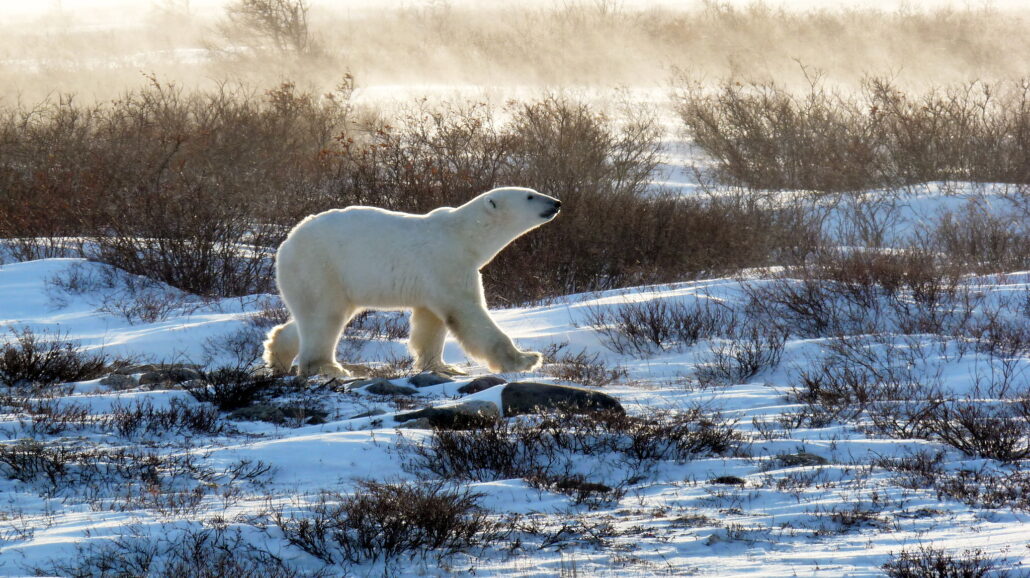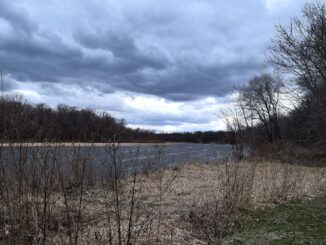
Climate change is killing off one of North America’s most iconic Arctic animal populations, scientists are warning in a new report.
Manitoba’s polar bears are among the Canadian province’s most popular tourist draws. Every year, thousands of travelers make their way to the Hudson Bay coastal community of Churchill to catch sight of these massive snow-white bears at neighboring Wapusk National Park and the surrounding area.
Wapusk’s polar bear population survives winter by hunting on the ice pack that forms in Hudson Bay every winter. But global warming is causing this ice pack to thin and recede, and the pack ice doesn’t stick around as long as it used to.
Pretty soon, there won’t be enough winter ice forming every year to sustain Hudson Bay’s polar bear population. That’s the conclusion a team of scientists have spelled out in a new report published in the journal Communications Earth and Environment.
“If we fail to limit global warming to less than 2 degrees Celsius, we will lose Hudson Bay’s populations of polar bears,” said University of Manitoba professor Julienne Stroeve. Stroeve served as the lead author of the new report.
The research was conducted by scholars from the University of Manitoba, the Arctic University of Norway, the University of Toronto, and the nonprofit organization Polar Bears International. Researchers from the Canadian government also assisted.
The study predicts that polar bears will become extirpated from the shores of Hudson Bay sometime between 2030 and 2060. Extirpation means a localized extinction; polar bear populations will likely still be found at much higher latitudes in the North American and Eurasian Arctics.
Global warming is squarely to blame, the team said. They predict the extirpation of polar bears from Hudson Bay is virtually guaranteed unless drastic changes occur; changes resulting in sharply lower volumes of greenhouse gases accumulating in the atmosphere.
The Hudson Bay polar bears are the world’s southernmost subpopulation of polar bears, migrating farther south due to the uniquely frigid conditions occurring every winter in the region.
Wapusk National Park is located at roughly the same lines of latitude as Scotland. Polar bears inhabiting central Canada can be found as far south as the coast of James Bay in Ontario, or as far south as Ireland and England.
The University of Manitoba-led research team says polar bears won’t be found this far south for much longer.
“The disappearance of the Southern Hudson Bay polar bears is imminent, with Western Hudson Bay not far behind,” Stroeve said.
With an increase in average Earth temperatures of 2 degrees Celsius, Hudson Bay will become ice-free for up to 182 days, the study concluded. Under these conditions, they say the polar bears would find it very difficult to survive and expand their numbers.
An increase in average global temperatures exceeding 2 degrees Celsius would mean the polar bear’s extirpation from Hudson Bay would happen sooner, with an even longer ice-free period occurring, the scientists said.
The report draws a clear line between climate change, its negative impacts on a large wild species of mammal, and the severe economic hit that a local economy can expect as a consequence.
Wapusk National Park is remote but accessible from Churchill, which can be reached by flight or train.
The polar bears that call the park and the region home are far and away the strongest tourist draws to Churchill and the surrounding communities. Several companies operate polar bear tours featuring large, elevated, reinforced vehicles that permit passengers to enjoy close encounters with polar bears while staying safe.
The Canadian government estimates that polar bear tourism helps the Churchill and Wapusk regions generate nearly $7 million in revenues every year.
The researchers say there is also a risk that less snowfall and more rain will make it more difficult for seals to create dens for raising their young. The polar bears prey on seals for their survival.
The report concludes that the survival of Hudson Bay polar bears hinges on national governments keeping to and fulfilling the goals of the Paris Agreement on Climate Change.
In the 2015 Paris Agreement, nations pledged to keep global average temperature increases to below 2 degrees Celsius and ideally to hold the temperature increase to no more than 1.6 degrees Celsius.
“Unregulated emissions could mean we could see the disappearance of the Southern Hudson Bay subpopulation as early as the 2030s,” said University of Manitoba assistant professor and report co-author Alex Crawford.
©2025 Public Parks
Park Info
Park:
Wapusk National Park Park
Location:
Manitoba, Canada
More Information:



